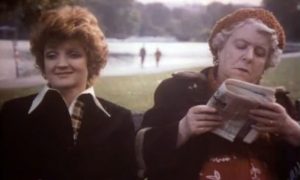David Mercer was a young writer from Wakefield who, in the days when such a thing was still possible, wrote a play on spec for the BBC and got it produced within a year. His third, A Suitable Case for Treatment, very nearly didn’t, but for the persuasive efforts of director Don Taylor on producer Elwyn Jones (‘OK, boy, you do it, then. And it damn well better be good, or you’re for it!’) It nearly lost out because it broke just about every rule in the then still-flimsy TV drama book: Cut-aways to old film clips, freeze frames, dream sequences, wildlife footage – and most alien of all, Morgan Delt, a hero who went beyond the usual dramatic boundaries of acceptable eccentricity into out and out schizophrenia. Rookery Nook this wasn’t. Three years later, with the zeitgeist finally starting to catch up with the disillusioned character of Morgan, a film version went into production. During a post-divorce crack-up, the working class Morgan (David Warner) lays siege to his posh ex-wife Leonie (Vanessa Redgrave) and her smarmily hyper-bourgeois art dealer boyfriend Charles Napier (Robert Stephens) from his new home – a car parked outside their front door. Obsessed with gorillas and berated by his old-school socialist mum (Irene Handl) who ‘refuses to de-Stalinise’, Morgan becomes a mischievous ape, shaving a hammer and sickle into Leonie’s dog, pulling a gun on Napier, blowing up Leonie’s haughty mother with a smoke bomb, and finally gatecrashing Leonie and Charles’s wedding reception in a gorilla suit.
Morgan doesn’t go in for ponderous speeches of self-analysis – he acts his anguish out. Shambling about in a baggy Aran sweater, he’s a bipolar cross between Peter Cook and Johnny Rotten, maniacally grinning like a cat that’s just been made director of United Dairies one moment, howling at the walls with primate rage the next. There’s a tidal wave of razor-sharp comic dialogue – Handl reminisces ‘Your dad wanted to shoot the royal family, abolish marriage, and put everybody who’d been to a public school in a chain gang. He was an idealist, was your dad.’ In between, Redgrave makes no secret of which suitor she secretly prefers, Bernard Bresslaw turns up as a childlike, infinitely gullible copper for a kerbside lecture on Trotsky, Arthur Mullard plays a wrestler who helps Morgan kidnap Leonie for an abortive wilderness retreat, and Morgan gives his mum a piggyback ride across Highgate cemetery. In short, everything the makers of Love, Actually foolishly left out. Mercer fell out of love with the film version, claiming director Karel Reisz took his screenplay too far up the zany swinging comedy route. As the Beeb saw fit to evaporate the original play it’s impossible to judge now, but while the film may have swapped the original’s claustrophobic teleplay black studio limbo for washed-out west London locations, and removed the character of Morgan’s new girlfriend to boot, it’s hard to imagine original Morgan Ian Hendry besting Warner’s brilliant performance. ‘60sed-up or not, it still has the trademark Mercer mix of bitterly sardonic humour and lonely, childlike pathos, all the while punching the viewer with love.





















